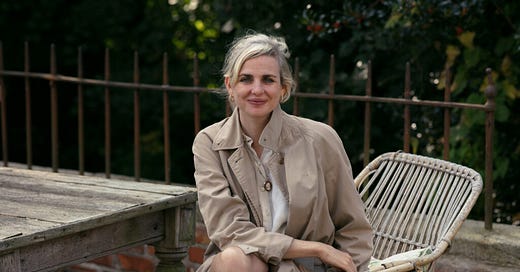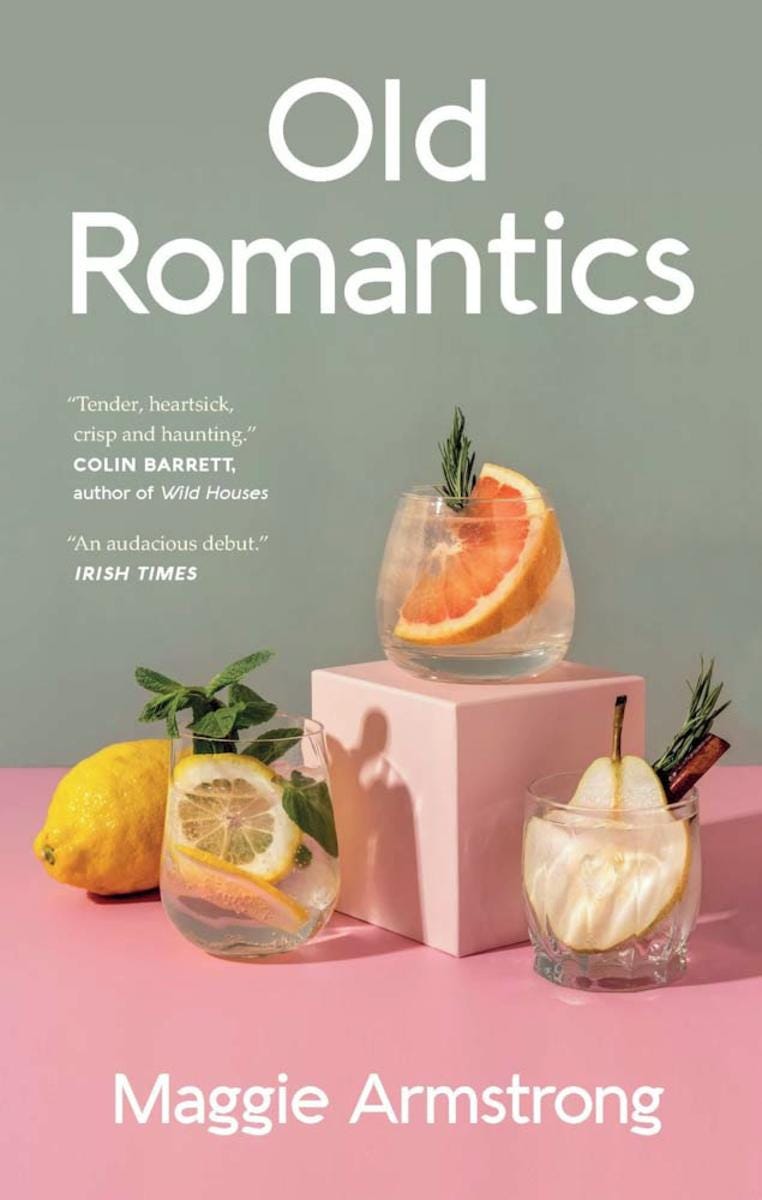Irish Writer Maggie Armstrong reflects on a life-changing book
"I disappeared into this book, and emerged with a sense that the world is cruel and wanton to those who deserve much more."
Why I Write: Q & A with debut author Maggie Armstrong
Maggie Armstrong’s work has appeared in the Dublin Review, The Stinging Fly, Banshee, and elsewhere, and was longlisted for a 2023 Irish Book Award. She lives in Dublin.
Old Romantics is her first book.
Shortlisted for the Kate O’Brien Award
Shortlisted for the Irish Book Awards Sunday Independent Newcomer of the Year
"As for the prose, you could bathe in it. The details, the clever turns of phrase. A ticking clock is 'strict, censorious, like a clacking tongue'. A heart bangs 'like a broken toy.'"
—Niamh Donnelly, Irish Times
Describe your writing space. What do you love about it?
Nine years ago I took a desk on Great Denmark Street in the heart of Dublin city with another writer friend. The two desks are at opposite ends of an unadorned attic room that overlooks Belvedere College, where James Joyce went to school about 130 years ago. Sometimes the boys go on the roof for band practice and I imagine a young Joyce doing something similar – he was a gifted tenor before he went wild with the books. The city looks very calm from above, though I know that it is not a calm or settled place, and the cry of the seabirds spells a sense of urgency. I love going out the door to work, just like my father always did. It does me a world of good. Leaving the house feels like a massive feat, and I love cycling or taking the tram then drinking tea and eating chocolates to my heart’s content while I do, in reality, very little work.
How important is it to have ‘a room of one’s own’?
I don’t think it’s a deal-breaker. Few of us have the luxury or the wherewithal. If you want to write, you’ll do so by any means, even on a cocktail napkin. I do however have a fetish for a nice inky black pen. A good pen and a fancy notebook come before privacy for me.
Any rules for when you’re in this ‘space’?
My rule is that I am not strictly allowed to look at my phone, and the app Freedom has really helped with this discipline. It’s like taking a tablet that cures you of the internet, but for a limited amount of time, and it only masks the symptoms. The problem of the internet prevails, and yet, you’re probably reading this with the help of the internet aren’t you? I see the wiles of the World Wide Web like those of any drug. Better to smoke one cigarette a day than forty: better to limit our intake than chain-smoke our lives away.
What is your writing practice like?
Highly unpredictable. I am a single mother to young children, and I have to do other kinds of work that is not creative to keep us going. The demands of every day frequently prohibit writing very much.
“Yet I always make sure I write a little, every day. Even if it’s just a flimsy paragraph, like yesterday. It’s still words. Maybe one day, someone will read them?”
Do you quantify your process by word count or hours spent writing?
I like to write long-hand, in which instance counting words is pure distraction and tomfoolery. I do try to do a certain number of hours while my younger is at playschool, but those hours aren’t always fulfilled, sadly. Sometimes your pen flies out of control and writes eight pages on your behalf, other times you can’t even get to the end of a page, you feel so anaemic. But I do think you have to try. The results will never be as bad as you fear they will be.
What is your creative process like?
Scattershot. Haphazard. Tortured. Glorious. I can’t think of a happier process, except possibly making, and eating, a delicious lasagna involving spinach and cheese.
What is the easiest and most difficult part of the process for you?
I adore beginning stories. I love giving them names. Endings are the bane of my existence. My first collection, Old Romantics, had I think six different endings and I was happy with none of them.
Why do you write? What do you love about writing?
I write because there’s absolutely nothing else I can bear to think of doing. I love the remarkable ways you can surprise yourself with a word or a plot turn while you write.
How do you manage writing with other demands on your time?
Very badly. Frequently I fall asleep writing a story that becomes an ink leak on my bedspread. I’m certain I’ve lost entire short stories on loose sheets of paper I forgot to organise. But on weekdays I often put on a clean, ironed shirt, a pair of tights and polished boots. Even if I’ve seen nobody older than the age of eight for a whole day, I feel like a professional.
What has influenced you most as a writer?
My own folly and regrettable mistakes. I mean, they have to be put to some use.
Do you want each book to stand on its own, or are you trying to build a body of work with connections between each book?
That is a brilliant question, because yes, subconsciously and lately more consciously, I have been trying to build a body of work, with characters from the same fictitious cast recurring through books. I grew up reading every single Babysitters Club book by Ann M Martin, and became intimate friends with Stacey and Jessie and all the gang. I love John Updike’s Maples stories and still imagine that some day, I might meet Joan and Richard Maple. I mean why do people rush to the movies to see Bond or Sherlock Holmes or Bridget Jones? We want the next installment.
Best advice you’ve ever been given.
‘Bang out the words’ – my brother, Frank Armstrong.
What does success look like to you?
Evening time, the dishwasher whirring, and two healthy children reading their Lego or Peppa magazine while I take out a book and – just maybe – sip an ice-cold glass of beer.
Tell us a few things that would surprise us to learn about you: the person, the writer.
Sometimes, when struggling for a word, I exploit the uses of the Oxford Thesaurus. Because I am sometimes entirely lost for words. I imagine some must see this as the most egregious form of cheating. I have a terrible weakness for a thesaurus. It reminds me of my darling late father, who was a sucker for a new toolbox. He must have had five very heavy and overflowing boxes of tools, and still he would come home from a German supermarket and reveal a new purchase with the words: ‘What do you think of my new box of tricks!’ His tricks are my thesaurus.
What can books teach us? How do they change us?
Books can teach us to pause and look with wonder at a world that is otherwise drab and one-dimensional, lacklustre. We so often need to see it through another person’s eyes. However, I am not certain they change us for the better. I suspect that if you are subject to occasional delusions, or inclined to turn everything you experience into a story, the fault probably lies with books and their partners in crime, movies.
What was a transformative book for you in your life?
Jude the Obscure was among the first big books I ever read, MY mother bought it for me before I set off to France for the summer and it took me aged 16 from girlhood into the shock of maturity and was the cause of much sunburn (I read it in the sun while I was supposed to be looking after small children). I disappeared into this book, and emerged with a sense that the world is cruel and wanton to those who deserve much more.
Which authors, living or dead, would you most like to discuss writing with?
Off the top of my head, Beckett, though I hear he was more comfortable talking about cricket or rugby, which would have made him all the more intriguing. I am certain I would have fallen right in love with Beckett, and with the poets Louis MacNeice and Leonard Cohen. I’d have loved to have had a few sherries with Muriel Spark, to find out exactly how her mind worked. Jane Austen too – I’d say she was marvellous craic.
Who are your favourite writers writing today?
I’m shooting from the hip here, and leaving out so many important ones but what the hell! Niam Campbell, Nicole Flattery, Sally Rooney, Kevin Barry, Bridget Hourican (whose biography of the forgotten Dublin poet James Clarence Mangan is simply terrific), Halle Butler, and comic-book writer Dav Pilkey, because he has given my son so much delight.
What books are you currently loving?
A Way of Life Like Any Other by Darcy O’Brien, and the latest from Tramp Press, Water in the Desert, Fire in the Night, by Gethan Dick, an apocalyptic book concerning midwives, wolves and much more. I trust everything they publish.
If you were a bookseller what 5 books would you hand-sell to readers and why?
Modern Times, Cathy Sweeney’s short stories, for their economy and humour in which extraordinary compassion lies hidden.
The Death of the Heart by Elisabeth Bowen, a masterclass in disillusion
A Far Cry from Kensington by Muriel Spark, because it is an utter scream throughout
JD Salinger’s Franny and Zooey, for the vim and verve of the voice of the stories and their brevity
And JG Farrell’s Troubles, because the moment you arrive with the Major in that Big House with its dry rot and dysfunction, you will forget the rest of the world.
What advice do you have for writers?
Write a little every day, no matter how scrappy or how useless it might seem. Write anything, no matter how terrible. You won’t regret it.
Thank you Maggie.
If you’d like to purchase any of the above books mentioned, please send us an email to: info@curiosityhousebooks.com or send us a message:
To watch a short clip of Maggie Armstrong reading an excerpt from her short story collection, Old Romantics, click here.
About Old Romantics:
“An audacious debut.”
—Irish Times
Like Dubliners, if Dubliners were "Cat Person" as a feminist mock-epic about a writer's coming of age—and every Dubliner was named Margaret.
A woman pursues the man who cut ahead of her in line. Two nice people report that a child has been left unsupervised at a local beach. Romances, old and new, shift and sour. Following Maggie Armstrong’s intrepid hero, Margaret, through first love, first bad date, first job, first extremely bad date, and on into midlife and its attendant disillusionment and revelations, Old Romantics is an acutely observed and hideously entertaining collection of linked short stories from an astonishing new talent. Endearingly flawed and perilously honest, Armstrong’s characters navigate a world of awkward expectation and latent hostility with piercing insight and indelible wit.





